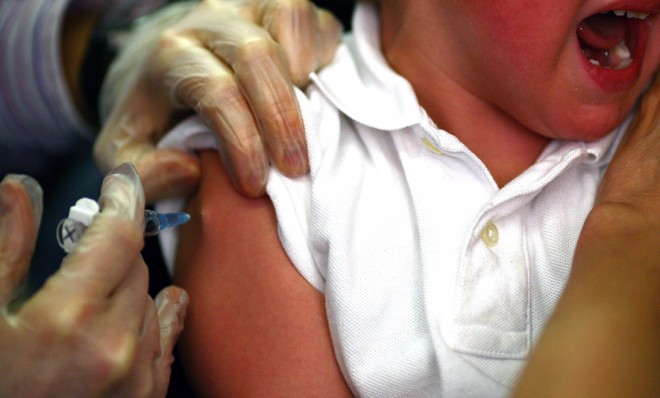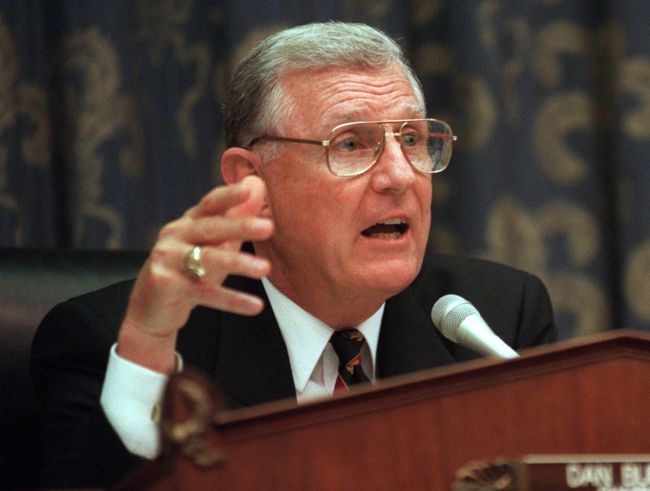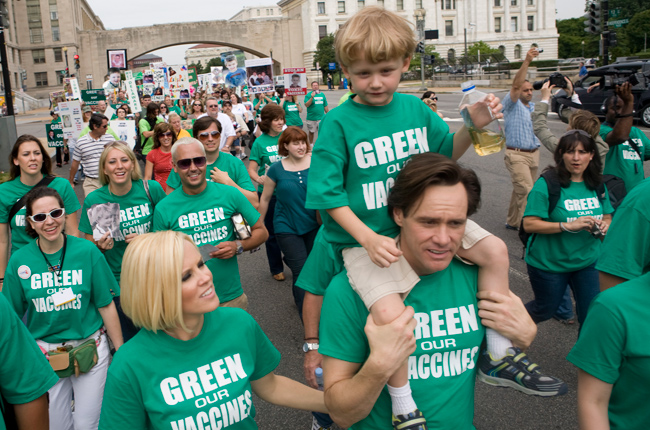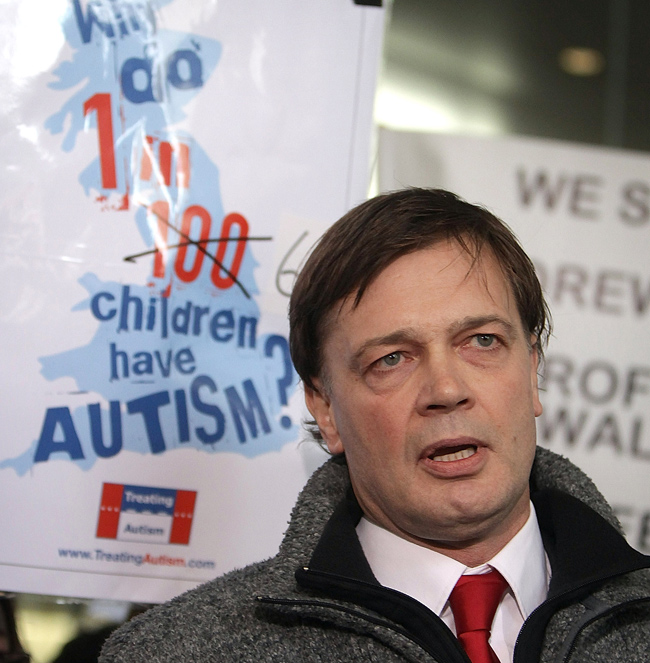Autism and vaccines: A timeline of the dubious theory and the ongoing debate
How a false claim made in 1998 instigated one of the most tenacious health controversies of our time


A free daily email with the biggest news stories of the day – and the best features from TheWeek.com
You are now subscribed
Your newsletter sign-up was successful
In 1998, a British researcher suggested that immunization shots may have a negative effect on an infant's developing brain. Ever since, many medical experts have worked to prove that childhood vaccine schedules are safe. The link between vaccines and autism has been debunked on numerous occasions — most recently in a study published March 29 in the Journal of Pediatrics — and the aforementioned researcher was stripped of his medical license for his dubious assertion. And yet the debate persists. One of the reasons for the lingering belief is that the number of diagnoses of autism spectrum disorders is rising at an unprecedented rate, while the causes of the disorder continue to elude us. And so, backed by the power of celebrity and social media, anti-vaccine proponents continue to blame the shots, only to prompt further research on the subject. Here, a look back at this frustratingly persistent cycle:
1998
Doctors from London's Royal Free Hospital release a study, published in the medical journal Lancet, suggesting a link between a vaccine given to "600,000 children a year" and a disease, marked by an unusual inflammation of the gut, that is associated with autism. Of the 12 children with the disorder who were studied, eight developed symptoms after receiving the MMR — the measles, mumps, and rubella — vaccine. The doctors hypothesized that the combination measles, mumps, and rubella immunization shot "delivers a jolt to the child's developing system." However, during the press conference, the doctors are divided about the implications, with most saying the vaccination should continue, and the lead author, Dr. Andrew Wakefield, saying the shot should be divvied into its three components and given separately. Alongside the study, Lancet also publishes a commentary skeptical of the findings and warns of a "social tragedy" if the public turns against the shot. The commentary makes the case that the first symptoms of autism coincidentally appear around the time the MMR shot is administered, age 12 to 15 months.
The Week
Escape your echo chamber. Get the facts behind the news, plus analysis from multiple perspectives.

Sign up for The Week's Free Newsletters
From our morning news briefing to a weekly Good News Newsletter, get the best of The Week delivered directly to your inbox.
From our morning news briefing to a weekly Good News Newsletter, get the best of The Week delivered directly to your inbox.
1999
Two studies, commissioned by the British department of health, confirm no evidence of a link between vaccines and autism. The first study reviews 92 cases of autism and finds in 36 cases the disorder was evident before the vaccination and in 28 cases autism ran in the family. The second study by Dr. Brent Taylor, analyzes 498 children with autism beginning in 1979, nine years before the advent of the MMR vaccination. Taylor monitored the age at which autism presented itself in each child. His team found that the introduction of the shot had no connection with the steep rise in autism. "I do hope our results will be able to reassure parents and others. A very large number of children are presently at risk of these very seriously damaging and occasionally fatal disease."
July 1999
The U.S. government calls for the removal or reduction of thimerosal — the mercury-based additive — from vaccines to avoid any possibility of infants being exposed to more than is recommend by federal guidelines. Thimersoal had been used to prevent vaccines from being contaminated by bacteria since the 1930s.
A free daily email with the biggest news stories of the day – and the best features from TheWeek.com
2000
U.S. parental advocacy group SafeMinds launches. The group seeks to promote the theory that thimerosal causes autism. Lead members of the group later publish "Autism: A Novel form of Mercury Poisoning" in Medical Hypotheses. SafeMinds and its controversial theory gain support from advocates of autism awareness, including Indian Rep. Dan Burton (R).
April 2000
Rep. Burton, whose granddaughter has autism, calls a hearing of the House Government Reform and Oversight Committee to assess the findings of the 1998 Lancet study. Congress agrees to ask the Department of Health and Human Services to study whether vaccinations have caused a small number of cases of autism.

Rep. Dan Burton (R-Ind.) (AP Photo/Joel Rennich)
2001
Thousands of American parents of autistic children begin to file petitions seeking compensation through the Vaccine Injury Compensation Program, which was established in 1988 for those injured through childhood immunization shots. The claims are reviewed by special experts serving on the U.S. Court of Claims. Of the 12,850 cases filed in the program during its first decade of existence, 5,535 represented autism cases.
April 2001
A U.S. review by a panel of 15 experts — the Washington Institute of Medicine, an independent agency that advises Congress — concludes that the MMR vaccine is not responsible for the nation's rise in autism among children. This is the second time the original 1998 study is debunked.
2001-2002
Theresa and Michael Cedillo — who allege their daughter's autism was caused by a common vaccine she received as an infant — seek financial compensation. The couple had filed their lawsuit back in 1997, but proceedings didn't begin until 2001 because their attorney wanted to combine a number of autism cases from around the country.
2004
Celebrity Jenny McCarthy's son, Evan, is diagnosed with autism. He is 2-and-a-half years old. Over the next few years, McCarthy reportedly becomes "single-minded in her quest" to find help for her son. Evan endures "rigorous therapy" and alternative treatments, including a gluten-free diet.
March 2004
Ten of the 13 authors that wrote the 1998 study first suggesting the link between autism and the MMR vaccine retract their work. Citing insufficient data, they say "no causal link was established between MMR vaccine and autism." The lead author, Andrew Wakefield, does not join the retraction.
July 2005
Activist, attorney, and political scion Robert F. Kennedy Jr. pens an article called "Deadly Immunity," published in Rolling Stone and at Salon, claiming the vaccine industry is behind a conspiracy dating back to the Great Depression that aims to boost its bottom line. For decades, Kennedy writes, the industry has covered up the dangers of thimerosal. Kennedy alleges that in the early 2000s the Centers for Disease Control and Prevention tried to "whitewash the risks of thimerosal," and "ordered researchers to 'rule out' the chemical's link to autism." He continues: "The link between thimerosal and the epidemic of childhood neurological disorders is real." Salon retracts Kennedy's article six months later.
2007
The Cedillos' case is presented as the test case for the U.S. Court of Federal Claims. The parents of 12-year-old Michelle Cedillo ask the court to find that their child's autism was caused by common childhood vaccines. Hearings begin.
That same year, Jenny McCarthy reveals her son's diagnosis in her parenting memoir Louder than Words: A Mother's Journey in Healing Autism. On publicity tours she says she sees her role as "the one to come out about autism and just kind of spread the message to the world." In interviews she correlates the rise in the number of vaccines administered and the escalation of autism. Her advice to mothers regarding infant vaccines is "make a good choice. You select your vaccines."
2008
Jenny McCarthy and her then-boyfriend Jim Carrey lead a "Green our Vaccines" march and rally on June 4 in Washington, D.C. The couple hoped to use their star power to raise awareness of the dangers of childhood vaccinations and the link they believe it has to autism and other diseases. An estimated 8,500 individuals participate in the march with more than 50 media outlets present.
By the middle of 2008, the Vaccine Injury Compensation Program receives more than 5,300 petitions for compensation.
Meanwhile, a 7-year-old boy who went unvaccinated — unintentionally — brings measles into the U.S. after returning from Switzerland. The child exposes 839 people in the San Diego area to the disease. In 1962, a year before a measles vaccine was introduced, 500 Americans died from the illness. Of those exposed to measles by the boy in 2008, 11 unvaccinated children become sick.

Jenny McCarthy walks with Jim Carrey, who's holding Evan McCarthy, during the "Green our Vaccines" march on June 4, 2008. (Brendan Hoffman/Getty Images)
Feb. 12, 2009
A special court rules that evidence presented in three cases — including the Cedillos' — does not prove a link between autism and certain early childhood vaccines. "I feel deep sympathy and admiration for the Cedillo family," Special Master George L. Hastings Jr. wrote. "However, I must decide this case not on sentiment, but by analyzing the evidence. In this case the evidence advanced by the petitioners has fallen far short of demonstrating such a link."
2009 is also the year of the "swine flu" or the H1N1 pandemic. By April, the European Union advises Europeans to postpone nonessential travel to the U.S. By November 2009, some 47 million people are infected with the disease and its vaccine, which came out that same month, prompts a new level of concern over the autism-immunization link.
May 2010
Britain strips the lead author of the 1998 study, Andrew Wakefield, of his medical license after a two-and-a-half year case investigating the doctor's findings.
A U.S. study reports that the percentage of parents who delay or refuse an immunization shot rose from 22 percent in 2003 to 39 percent in 2008.

Dr. Andrew Wakefield waits in London with supporters for the verdict on his research on Jan. 28, 2010 (Peter Macdiarmid/Getty Images)
Aug. 27, 2010
A federal appeals court upholds the ruling made by a special vaccine court that vaccines are not to blame for autism.
January 2011
British publications publish the investigation into Andrew Wakefield, revealing that the "father of the modern vaccine movement" "misrepresented or altered the medical histories of all 12 of the patients" involved in the groundbreaking 1998 study. The editor in chief of the journal that published the report said Wakefield's work "seems to be a deliberate attempt to create an impression that there was a link by falsifying the data."
That same month, a poll conducted in response to the news of Wakefield's fraudulent research found that just a slim majority of Americans — 52 percent — think vaccines don't cause autism. Meanwhile 18 percent are convinced they do, and 30 percent aren't sure.
April 2013
A study published in the Journal of Pediatrics shows no association between autism and the number of vaccines an infant gets in one day. Lead researcher Dr. Frank DeStafano and his team say they hope the findings help to reassure expectant parents that the recommended vaccines newborns are supposed to receive in their first years of life are safe.
Sources: ABC News, Agence France-Presse, The Associated Press, CBS News, Centers for Disease Control and Prevention, CNN, Global Research, The Guardian, The Independent, Knight Ridder Newspapers, National Post, The New York Times, Parenting.com, People, PR.com, TIME, U.S. National Library of Medicine, USA Today (2)
Lauren Hansen produces The Week’s podcasts and videos and edits the photo blog, Captured. She also manages the production of the magazine's iPad app. A graduate of Kenyon College and Northwestern University, she previously worked at the BBC and Frontline. She knows a thing or two about pretty pictures and cute puppies, both of which she tweets about @mylaurenhansen.
-
 Film reviews: ‘Send Help’ and ‘Private Life’
Film reviews: ‘Send Help’ and ‘Private Life’Feature An office doormat is stranded alone with her awful boss and a frazzled therapist turns amateur murder investigator
-
 Movies to watch in February
Movies to watch in Februarythe week recommends Time travelers, multiverse hoppers and an Iraqi parable highlight this month’s offerings during the depths of winter
-
 ICE’s facial scanning is the tip of the surveillance iceberg
ICE’s facial scanning is the tip of the surveillance icebergIN THE SPOTLIGHT Federal troops are increasingly turning to high-tech tracking tools that push the boundaries of personal privacy
